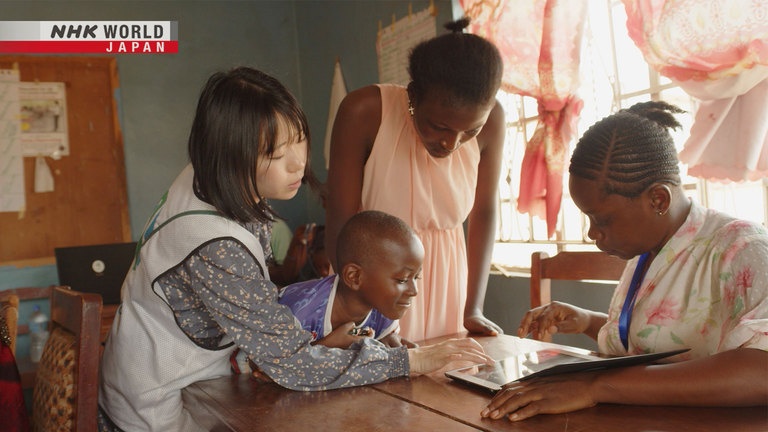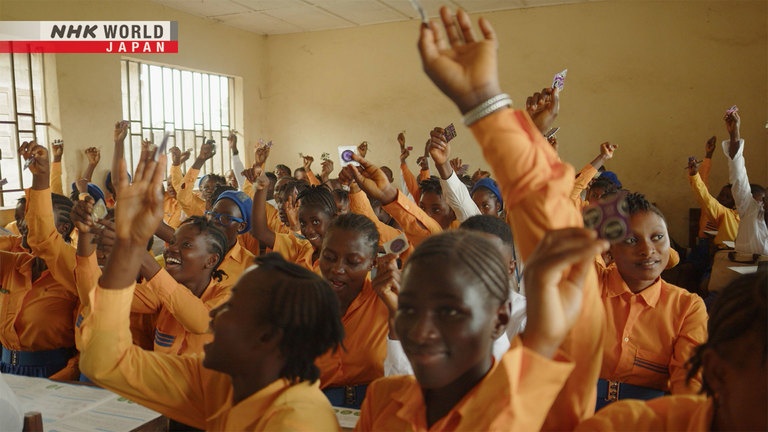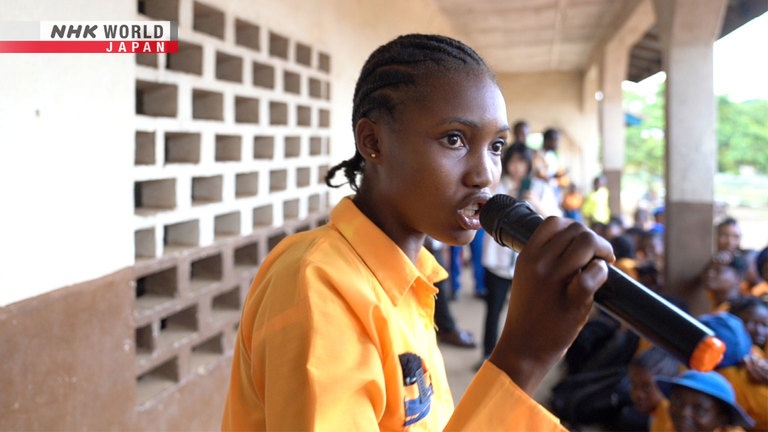Sex Education for Gender Equality: Sierra Leone
Many teenage single mothers in Sierra Leone have difficulties continuing their education. Shimosato Yumemi has founded an NGO that helps these mothers and teach sex education across the country.




Transcript
Sierra Leone, a West African country home to 8 million people.
77% of the population practices Islam, and many citizens have a conservative mindset
that women are inferior to men and should be protected.
Premarital sexual relations have long been frowned upon,
and abortion is forbidden by law, even when both parties consent.
Despite these factors, Sierra Leone has one of the highest teenage pregnancy rates in the world.
At 2020 government survey revealed that around 21% of teenage girls had given birth or were pregnant.
Many of these young women are abandoned by the man who made them pregnant,
and become unable to balance their studies with their duties as a single mother.
They're thus forced to give up on valuable educational opportunities.
Most of our pupils have been gone out of school because of early pregnancy and early births.
Somebody will come and impregnate a girl.
He doesn't have any money to sponsor that child and the mother.
One NGO founded by Japan native Shimosato Yumemi is trying to change this reality
by supporting single mothers financially and helping them return to school after childbirth.
The NGO has also begun teaching a sex education program in schools,
through which they hope to improve teenagers' understanding of sexual health.
Over 20,000 students from 68 schools have already taken part.
We want to reduce early pregnancies
and help girls go to university.
That will open up options for their future,
and help them realize their dreams.
We're working toward a society in which
anyone is able to chase their goals.
However, the topic of sex continues to be taboo in Sierra Leone,
and the project has had its share of difficulties.
We virtually want the children to avoid sex at an early age.
So if we're talking about using condom, pills, it's like we are justifying the engagement of sexual activity,
and unfortunately, we want to deviate from that.
Let's follow Shimosato and her team's efforts to help Sierra Leone's youth build a gender-equal future.
Kenema, Sierra Leone's third largest city, lies in the country's Eastern Province.
With a population of around 250,000, it is best known as a hub for diamond mining.
This is a secondary school in the city's downtown area.
Around 2300 students are taught here, from grades 7 through 12.
Shimosato and three staff members from her NGO are here to teach their sex education program to 100 students in their final year.
Good morning. Good morning.
I am director of JaSiLe Foundation from Japan.
This sexual education program aims to inform teenagers of human rights and articulate knowledge regarding sex.
The program runs for two hours.
Students here learn about reproductive functions and birth in their biology class,
but this is the first time they are learning about sexual intercourse.
First, the team conducts a survey to understand the students' backgrounds.
Teachers, this is a very sensitive survey.
So, please, we need please more spaces.
Shimosato takes great care to protect the students' privacy.
Can you go outside, please?
According to the survey, almost 30% of this class has sexual experience.
The program's educational materials were mainly created by Shimosato
and the NGO's local manager, Pidia Joseph.
They based the content on UNESCO's international sexuality education guidelines,
a resource created to help countries work towards a gender-equal society.
The materials focus on the practical knowledge needed to prevent unplanned pregnancies.
The first part of the program covers the importance of condom usage.
"Who did not get?"
The survey revealed that almost 60% of the students don't know how to use a condom.
We know condom. If it is placed here, we can identify that this is a condom, right?
Okay, so we are saying it's good for us because it helps you,
it prevents you from getting sexually transmitted disease.
It helps you from that point, prevents you.
- So the only way you can get, you can save from both pregnancy and disease is what?
- Condom.
- You use what?
- Condom.
Condom.
They need to know it's their right to decide
when to become pregnant and when to give birth.
So it's very important for them to learn
proper birth control methods.
The next part of the program focuses on consent before sexual intercourse.
This is an important topic that requires a mutual respect for human rights,
so Pidia has an in-depth conversation with the students to hear their thoughts.
Sexual consent. If someone asks you for sex, you must have to agree.
You accept if you are willing, you agree.
If you are not willing, you say no.
If the other person did not say no, it is a sign that it is okay to have sex.
- Yes? Or what is it? Yes or no?
- No!
You say yes?
How many people say yes?
Okay, okay, let me ask you this way: we are talking about consent.
- If somebody do not say anything, does that mean that person consented or not?
- No!
Okay, okay... What we want to learn from here now is that,
if the person doesn't say anything, meaning no consent is no, right?
The sex education program today was fine.
We will be preventing our sisters, our mothers, our colleagues,
not to have unintended or unwanted pregnancies so they will continue their education and studies.
This is the office of Shimosato's NGO, "JaSiLe."
Shimosato runs the organization from Tokyo,
visiting Sierra Leone once a year to check on its progress.
She employs four local staff, with whom she conducts educational initiatives.
In addition to the sex education program,
Shimosato also runs a project to provide financial aid to single mothers who wish to continue their education.
Hello! You need? Okay...
The project currently sponsors 52 single mothers, with funds mostly raised from supporters in Japan.
Once every three months, the mothers visit the office so that staff can check up on their mental and physical health,
their progress at school, and the well-being of their child.
The team wants to make sure the young women are able to balance their studies with their parental duties.
- Did you get any problem last month?
- Yeah, problem... expensive food.
For the first two years of the project, the beneficiaries received ten US dollars in cash every three months,
but in January 2024, the NGO launched a monthly digital payment system.
They also provide mothers with free phones and SIM cards,
to ensure they are able to make use of this service.
It's better if we send them money gradually
to prevent misuse or saving.
That's why we made the switch
to digital money transfers.
This is Isata, a third-year high school student.
She and her 4-year-old son, Musa, have been receiving financial aid for the past 2 years.
Sick...? You wanna become doctor?
Isata's home is located on the outskirts of Kenema.
She lives there together with Musa, her parents and her four siblings.
Five years ago, Isata became pregnant after an encounter with a classmate at a local night club.
It's unfortunate that Isata became pregnant.
I saw her puking, and I took her to a doctor,
who confirmed the pregnancy.
We were angry, and we went to the boy's parents,
but they said it wasn't their problem.
I felt so hurt that I cried.
At school, as her stomach began to show, Isata became a target of bullying from her classmates.
They knock at me.
Even in school, they give me some names, call me all sorts of names.
Isata eventually dropped out when she was eight months pregnant.
A year later, a staff member from a local NGO that works with JaSiLe saw her walking around town with Musa,
and suggested that the group give her their support.
As for me, as I was pregnant, I already thought that I am not going to be educated.
I always say that because I was ashamed to come to school.
And even when I saw my colleagues, I hide.
So... but they came into our house and encouraged us, gave us bonus to come to school, explained how education is important to us.
The team then made several visits to Isata's home over the course of a month.
After they made the case that her family would be proud if she returned to school,
Isata finally made the decision to continue her studies.
JaSiLe has a policy of sending several single mothers back to a school at the same time,
so they can make friends more easily and avoid prejudice.
Thanks to this policy, Isata was able to fit in right away.
My dream to the future, I want to become a bank manager.
Now I feel free among my friends.
Although I was shy at them, but now I am so glad that I am now free among them.
We play together, create a lot of fun.
Don't eat. Don't eat.
Don't eat. Don't eat.
Shimosato herself happens to be a single mother of two children, aged four and three.
How old? ... Three years.
She's the same age as my son, but she's so light.
She must be something like half his weight.
She also comes from a single parent family, raised by her mother
after her parents divorced when she was one year old.
When Shimosato was a high school student, she happened to watch a TV documentary on Sierra Leone's civil war.
The words of an orphan featured in the program changed her life.
There was a boy named Alazi.
The crew asked him if he wanted anything.
He replied that he just wanted to study.
I never forgot those words.
I knew then I wanted to help children
get education in Sierra Leone.
Shimosato went on to major in international cooperation at university.
After graduation, she elected not to look for full-time work,
instead founding a volunteer organization aiming to support education in Sierra Leone.
In 2016, Shimosato was finally able to visit Sierra Leone for the first time,
and her group began giving financial support to elementary schools in remote areas of the country.
They supported around 2,000 children, allowing them to attend school
by providing textbooks, stationery, and school lunch expenses.
However, as she continued her work,
Shimosato came to the realization that there was a gender disparity in the education sector.
I saw that it was only girls
dropping out of school.
I started wondering why that was.
In Sierra Leone, around 80% of women undergo female genital mutilation,
in an attempt to control their sexuality and promote premarital virginity.
In 2014, the country was struck by an Ebola virus epidemic.
Despite its deeply conservative culture,
the resulting public unrest sparked a rise in cases of underage rape.
The economic downturn caused by the virus also led to an increase in teenage prostitution,
as a means for girls to support themselves and their families.
These factors caused a sharp spike in unplanned teenage pregnancies,
and the government reacted by banning pregnant students from attending school,
under the reasoning that they would disrupt public morals.
This ban was clearly prejudiced,
and a violation of human rights.
I started the financial aid project
to help these girls continue their schooling.
The school ban lasted five years before it was finally lifted,
following criticism from local and international human rights groups.
Three months later, Shimosato decided to start providing financial support
to single mothers who were unable to return to school on their own.
To help her launch this project, she recruited Pidia, a well-respected local community leader.
Following university, Pidia worked as a teacher, before taking up a position at an international NGO,
where he taught informal classes to men about women's rights.
His classes were covered by various media platforms, and eventually caught Shimosato's attention.
I used all kinds of methods to look for him.
I searched all over social media.
It took me months to find him.
We connected on a chat app,
and she asked me, "Are you Pidia?"
I said "Yes, that's me."
She said that we had the same dream
and she wanted to work together with me.
I said yes, because I wanted to
make that dream come true.
In 2021, Pidia became the manager of JaSiLe's new office in Kenema,
joining the project to help teenage single mothers return to education.
The following year, JaSiLe began teaching their sex education program in Kenema area schools,
with the goal of reducing unwanted pregnancies.
Shimosato regularly updates the sex education materials,
based on the reactions of the students to the program.
This condom is the cheapest one at the store.
I'm going to write its price in here.
7 leones for a pack of three,
so I'll write 3 leones ($0.13) each.
The materials are being developed in cooperation with Kenema's Ministry of Education and the local police department.
JaSiLe's staff reviews their content updates with them every month.
Today, they've come to meet with the Kenema police's family support coordinator.
- Good afternoon.
- Good afternoon.
- Good afternoon, have a seat.
- Thank you.
This is our new textbook for our sex education program.
I give for you.
This page of new content concerning proper condom usage catches the coordinator's eye.
We virtually want the children to avoid sex at an early age.
So if we're talking about using condom, pills, it's like we are justifying
the engagement of sexual activity, and unfortunately, we want to deviate from that.
We are saying that we don't want them to take part in sex,
but in case there must be some exception, we warn, if you want to do it, take the precaution.
This is for official use and I don't want to fall within your mandate,
I'm talking around my own mandate.
I have to sensitize, I want to train, I want to talk to people,
younger people about abstinence from sex at an early age, below 18.
So if I come to talk around condom and the like, it doesn't fall within my mandate.
That's what I'm saying.
It's hard to change the minds of people...
...who tell us something can't be done
because of cultural reasons.
We need to find a way to overcome this situation.
Shimosato must find a way to navigate these traditional values
as she seeks to deliver her message to Sierra Leone's younger generation.
Two days after their visit,
Shimosato and her team have returned to the downtown Kenema school for a new project.
The project is a sex education themed speech contest,
featuring five male and five female student participants.
Shimosato, the school's teachers and a Ministry of Education official will judge the contest,
based on both the speeches' content and delivery.
I wanted to give the students a chance
to make lifelong memories.
That's why I decided to organize this speech contest.
The first participant is a male student who speaks regretfully of his past mistakes.
I once got a girl pregnant, because I wasn't educated.
I am appealing to you all now not to do the same thing.
Isata also takes part, with a speech focusing on gender inequality.
Every day in every country in the world, women are confronted by discrimination,
by facing violence and unequal treatment at home and in our wider community.
The winner of the contest is Messi,
who takes the opportunity to speak out against discrimination towards women in the household.
One, girls are being discriminated so they should be in the kitchen,
while boys are there to eat.
Two, girls are being discriminated to do domestic work at our native house like sweeping,
fetching of water and many more, while boys will sit and look at them.
Nowadays in our society, girls are being discriminated because they are being impregnated so they no longer go to school.
They should stay at home and become mother, which is totally debunked by me.
Let us all join hands together to stop this discrimination among boys and girls.
There's a culture here of wives
being the property of men.
I thought it was really cool
that she called to change that.
I hope we can get closer to a society
in which anyone, male or female...
...can continue their studies if they wish to.
A society in which everyone can
chase their dreams on an equal footing.
Shimosato and her team will continue working hard to provide education to Sierra Leone's youth.
They hope to see this new generation update their country's traditional values
and build a truly gender-equal society.